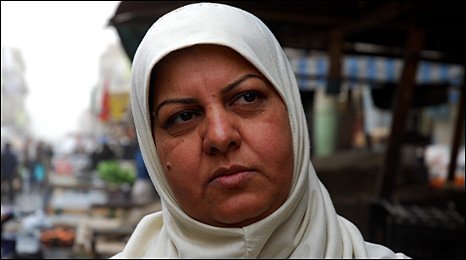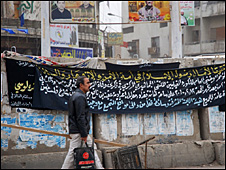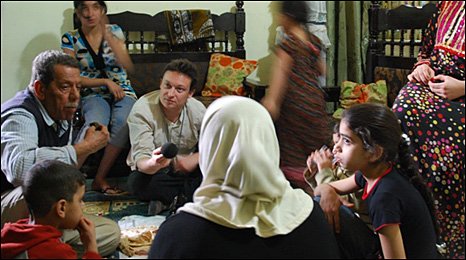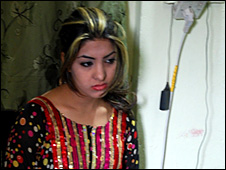
Baghdad grandmother Umm Sheyma is sometimes nostalgic for the past
|
By Gabriel Gatehouse
BBC News, Baghdad
|

We arrived at Umm Sheyma's home in the early morning. It was still dark in her small kitchen and by the light of a kerosene lamp she was making breakfast for her two little granddaughters. "I have five children and seven grandchildren," Umm Sheyma explained, as she set out cups of tea, beakers of milk, some cheese and some bread on a low table. "Our house is a small one, and you can imagine how noisy it gets when all my children and grandchildren are here. They have food with us every day." I wanted to spend the day with Umm Sheyma and her extended family to get a sense of how the daily challenges of life in Baghdad - the intermittent electricity supply, the endless checkpoints, the underlying fear of violence - was shaping people's views of this election. Just before 8am, the girls picked up their backpacks and set off to walk to school, under the watchful eye of grandma.

Blast walls surround Umm Sheyma's local market
|
"When my daughters were kids, they used to walk to school alone. But now there is no security, I trust nothing now. There is no security even with the guard in school," she told me. Nostalgia It would be wrong to say that Umm Sheyma and her family live in fear. There is laughter and carefree chatter as they made their way through the backstreets overhung by a profusion of electrical cables. But life in Iraq is highly unpredictable. The threat of violence hangs in the air, and anyone can be in the wrong place at the wrong time. Umm Sheyma talks about the past with sense of nostalgia. "Things changed after the fall of Saddam because of the explosions and the kidnappings. We began to worry about our children's safety." Few people would say they wanted Saddam Hussein back. But many look back with fondness on a simpler, more stable life.
 |
 I usually don't vote but this time I have to because I don't want to be deceived anymore
I usually don't vote but this time I have to because I don't want to be deceived anymore

|
Shopping After dropping the kids off at school, Umm Sheyma made her way to the market to buy provisions for lunch. To get there, you have to pass through numerous checkpoints and negotiate your way around blast walls. The main street is lined with stalls selling fruit and vegetables, wire cages full of live chickens and whole carcasses of lamb hanging in the doorways to butcher's shops. The cries of the fishmonger compete with the sounds of generators. This particular market has been hit by bombers in the past and that, says Umm Sheyma, wreaks havoc with her budget. "When there are bombings, prices go up. Plus, it's election season now and people tend to stock up on food in case of surprises - this also pushes the prices up." We bought tomatoes and aubergines. A little further on, we came across one of Umm Sheyma's relatives, selling brightly coloured pickles down a side street, a river of deep black mud. People seem familiar with each other here. As we progressed through the market the friendly greetings of the stall holders went some way to offset that thought which is always at the back of one's mind in Baghdad: expect the unexpected.

Three generations gather for lunch with Dolma on the menu
Nothing untoward occurred and at 2pm the family gathered back in Umm Sheyma's small front room to eat lunch. She, her husband and her two daughters, sat around a big metal platter placed in the middle of the floor. Umm Sheyma had prepared Dolma, a dish of onions, aubergines, and tomatoes stuffed with seasoned rice and mince. Assorted grandchildren clambered over laps and tugged on elbows, as everyone tucked in, tearing off pieces of flatbread and scooping up the food. Hopes and fears "I usually don't vote but this time I have to because I don't want to be deceived anymore. The current ruling parties haven't delivered anything these past four or five years," she said.
Her eldest daughter Sheyma has a family of her own. One of her main concerns is high unemployment. "We want more jobs. Most of our men are out of work, even though they are well educated," she said. But, as so often in Iraq, very quickly the conversation returned to the subject of security. "The situation has got worse recently. Iraqi security forces have started arresting people in their homes," Sheyma told me. "The other day they launched a search campaign. We were so frightened. They come and they arrest people without clear reason, and then release them a couple of months later," she said. Umm Sheyma's youngest daughter Aya is just 19. She is about to get married to an officer in the Iraqi navy. She too has had bad experiences since US troops handed over control in the towns and cities to Iraqi forces last summer. "The other day they [Iraqi security forces] knocked on the door at two o'clock in the morning, saying that they wanted a cup of tea. It's scary and they also shoot in the air." "They take away gold items and mobiles. They took away our rifle recently, and never gave it back." "That," she added, "would never have happened if American troops had been with them." Like many people in Iraq, Umm Sheyma and her sisters are caught in the middle of conflicting emotions. They dislike what they see as the American occupation, but have first-hand experience of the more unpredictable behaviour of the new Iraqi security forces. The Americans hope that these elections will prove to be a turning point for Iraq, an event that will heal sectarian rifts and put the country on the road to greater stability, allowing them to withdraw. But Umm Sheyma and her family are apprehensive - what will happen when the Americans leave? This is the question that everyone is asking.
|

~RS~q~RS~~RS~z~RS~21~RS~)








Bookmark with:
What are these?